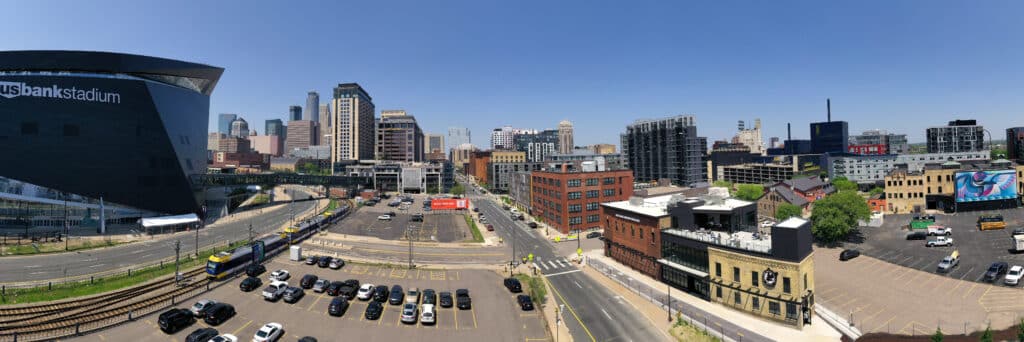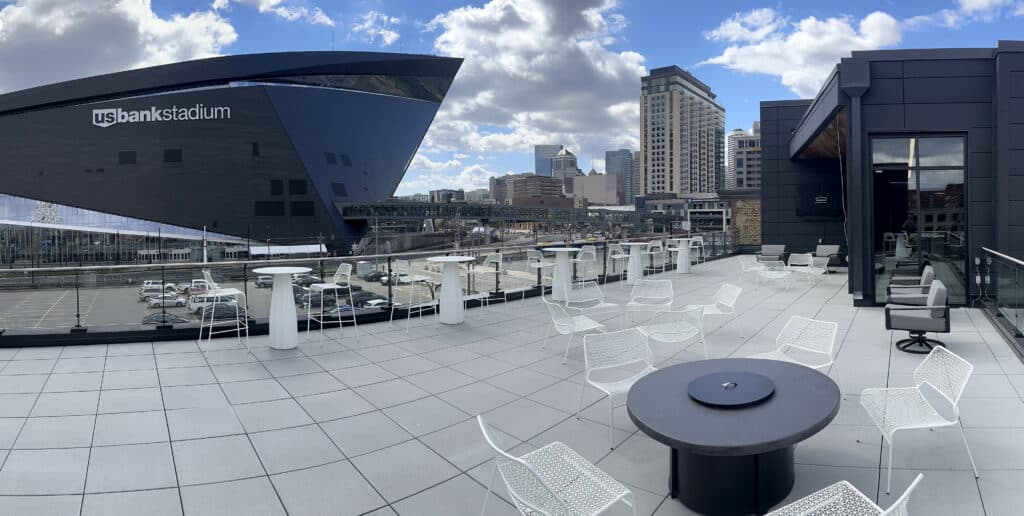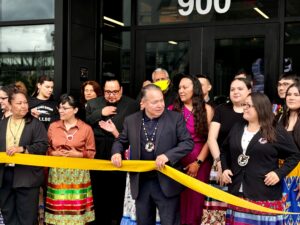On June 6, 2024, Red Lake Nation College (RLNC), a two-year college serving the Red Lake Nation Band of Chippewa, made history when it held a ribbon-cutting ceremony for its new three-building site in Minneapolis, Minnesota. An ATD Network college since 2017, RLNC opened in 2001 on the Red Lake Reservation in Red Lake, Minneapolis, a rural town on the shores of Red Lake in the north-central region of the state. RLNC’s new urban site is the first Tribal College site in the Twin Cities of Minneapolis and St. Paul. Its establishment also marks one of the first times an accredited Tribal college has ever opened a facility in a major urban area.
As luck would have it, two ATD coaches, Dr. Bobbie Frye, associate director of research and assessment and RLNC’s data coach, and Dr. Maggie George, CEO of education consulting firm Indigenous Research Associates and the college’s leadership coach, were on a site visit at RLNC the week of the opening. They made the four-hour drive from their hotel in Bemidji to Minneapolis to attend.
Located in downtown Minneapolis, Red Lake Nation College’s new site comprises the three adjoining buildings (constructed of brick, glass, and yellow brick) seen on the right. (Courtesy of Red Lake Nation College)
Both view the opening of the Minneapolis site as an overwhelmingly positive event that is reflective of the values that ATD Network colleges share — the importance of increasing accessibility and equity, offering an education that is culturally responsive, offering opportunities for social and economic mobility to students, and taking a student-centered approach to ensuring that students receive the supports that they need to be successful.
The effort to bring an education steeped in culture, language, and history to the large population of Native Americans living in the Twin Cities (and, thus, geographically distanced from the reservations that serve as their cultural centers) is not something entirely new for RLNC. Over a year ago, the college began offering online and personal enrichment classes in Minneapolis, and, according to Dr. George, who has served as an ATD coach to the college for more than six years, efforts were made in the past to include urban Natives in cultural events. “Red Lake [in the past] tried to find ways to make connections to the urban Tribal members … so they would make bus trips and bring the urban members to related cultural exposure activities at the Red Lake Nation campus,” she shares.
The rooftop venue at the new site, which is expected to bring in rental income for the college. (Courtesy of Red Lake Nation College)
But the opening of the new facility is a game changer, according to Dr. George, in terms of the accessibility to a culturally informed education that it affords Native American urbanites. “I think urban Natives and Tribal members have been disconnected from the Tribal community, especially from cultural and ceremonial activities,” she says. “The disconnect from Tribal community and homelands creates changes with Tribal identity and sense of belonging. [The new site] will offer culture, language, history, and teachings of the Red Lake Nation. It is a place where the urban Indian community can feel safe, be a part of the community, and connect with the Native staff.”
Given that 36.9% of Minnesota’s Native population lives in the Twin Cities region and that Minneapolis claims one of the largest Native populations in the U.S., expansion into the city holds the potential to make a difference in the decreasing six-year college completion rates among Native Americans reported by the National Student Clearinghouse Research Center.
According to a RLNC impact sheet, Native Americans have the “worst education achievement levels, largest socio-economic gaps, and the highest poverty rates of any of the major minority groups” in the state. The Minneapolis facility opens the door to partnerships with local businesses that could lead to workforce programming and, hopefully, socio-economic mobility for RLNC students.
Several facets of the new site underscore RLNC’s commitment to supporting its students holistically. Students will find academic counseling, mental health and wellness counseling, and a food pantry — all of which are in addition to the supports that Dr. George and Dr. Frye say that the college adopted during COVID-19 and decided to keep due to their positive impact: HyFlex programming, free laptops, and free internet to full-time students. “They are really thriving using those lessons learned from those [COVID] times that we were coaching them through, and they’re just applying it in general, taking some of those successes and expanding them,” Dr. George says.
The atrium at Red Lake Nation College’s new urban site. (Courtesy of Red Lake Nation College)
Red Lake Nation College President Dan King (center) and others prepare for the big moment at the ribbon-cutting ceremony on June 6.
Dr. Frye, who has coached RLNC since 2019, feels confident that the college will be eager to provide insights to other TCUs in the ATD Network about the expansion. In fact, she says the knowledge-sharing has already begun. “[RLNC] hosted tours for the [Cultivating Native Student Success] convening of the American Indian College Fund, [held June 11–13] in Minneapolis,” she notes. “There were 29 TCUs represented. They [RLNC] came and picked them up, transported them to the new site, gave them a full tour of the building, and shared everything they’re doing.”
Remarkably, the $16 million expansion project was completed entirely through federal, state, local, and Tribal funding coupled with alumni, corporate, and philanthropic donations, leaving the college without any project-related debt. The new site even boasts a rooftop event space that will be leveraged to bring in additional revenue.






